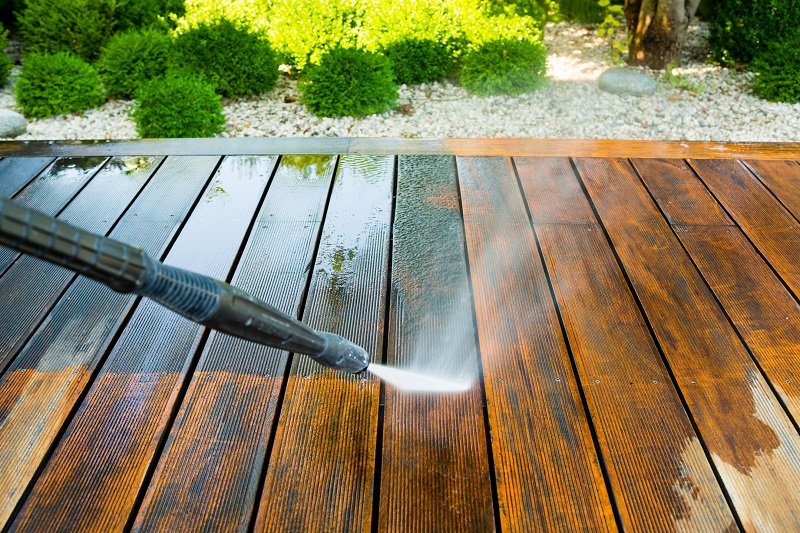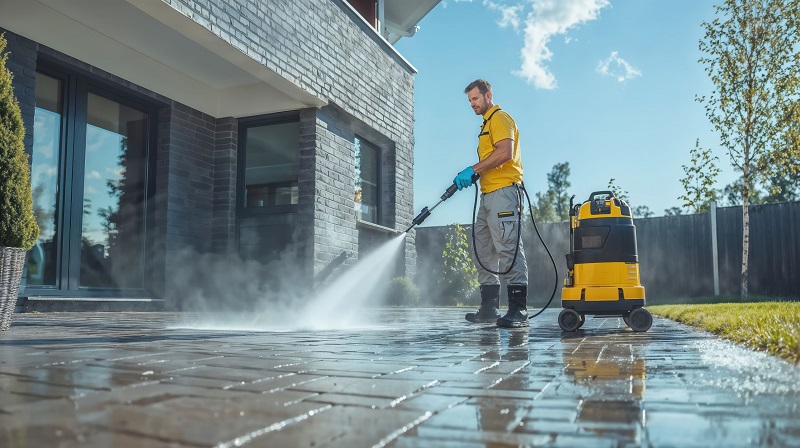Pressure washing is a cleaning technique that utilizes high-pressure water to remove dirt, grime, mold, and other contaminants from surfaces. This method is effective for cleaning driveways, sidewalks, patios, siding, and even vehicles. By harnessing the power of water, pressure washing delivers remarkable results while minimizing the need for harsh chemicals. But how does pressure washing work?
Read on to learn more about it and its numerous eco-friendly benefits.
The Science Behind Pressure Washing
Pressure washing employs a specialized machine that forces water through a nozzle at high pressure. The pressure is measured in pounds per square inch (PSI) and determines the cleaning power. The key components of a pressure washer include:
- Motor or Engine: It powers the pump.
- Pump: It pressurizes the water.
- Hose and Nozzle: These direct the water stream onto the surface.
Water’s kinetic energy breaks down and removes stubborn dirt, grease, and stains. Adjustable nozzles and pressure settings also allow users to customize the cleaning process based on the material being cleaned, ensuring safety and efficiency.
Therefore, for those seeking a professional touch, investing in pressure washing services can ensure optimal cleaning while addressing the unique needs of various surfaces. These services combine expertise with environmentally responsible practices, making them an ideal choice for homeowners and businesses.
Eco-Friendly Benefits of Pressure Washing
Pressure washing stands out as a sustainable cleaning method. Here are the top eco-friendly benefits:
-
Minimizes Water Usage
Pressure washing is a water-efficient cleaning solution that uses significantly less water than traditional methods like scrubbing or hosing down surfaces. The high-pressure stream effectively removes dirt, grime, and debris with precision, reducing the overall water consumption.
While a standard hose can waste gallons during prolonged cleaning, pressure washing uses a concentrated spray to target specific areas and achieve superior results in less time. This efficiency can help conserve water and translate into lower utility bills, making it an eco-friendly and cost-effective cleaning choice.
-
Reduces Chemical Dependency
Pressure washing’s powerful water stream can eliminate the need for harsh chemicals by relying on mechanical force to clean effectively. For tougher stains, eco-friendly detergents can be used to ensure minimal environmental impact. This approach reduces the use of toxic chemicals that can harm local ecosystems and pose health risks to humans and pets.
By limiting chemical dependency, pressure washing can promote a safer, greener cleaning process while delivering excellent results.
-
Prevents Surface Degradation
Over time, surfaces can deteriorate due to the buildup of mold, algae, dirt, and other contaminants. Pressure washing removes these harmful elements, helping maintain the structural integrity and aesthetic appeal of surfaces. Regular cleaning can also prevent premature wear and tear, extending the lifespan of materials such as wood, concrete, and siding.
By addressing these issues promptly, property owners can avoid costly repairs or replacements, contributing to waste reduction and long-term sustainability.
-
Improves Air Quality
Mold, mildew, and dust can accumulate on exterior surfaces, releasing allergens into the air and negatively affecting indoor and outdoor air quality. Pressure washing eliminates these harmful particles and promotes a healthier environment for residents and visitors.
Also, improved air quality is particularly important in urban areas, where pollutants are more concentrated, or for individuals with respiratory conditions like asthma. By removing allergens and irritants, pressure washing can contribute to a cleaner, fresher atmosphere, which enhances overall well-being and quality of life for everyone.
-
Conserves Energy
Manual cleaning methods often require extensive physical effort, time, and additional resources like brushes and sponges. Pressure washing simplifies the process by delivering high-powered cleaning with minimal energy expenditure. The force of the water stream tackles stubborn grime in seconds to complete tasks more efficiently than traditional methods. This reduction in effort and time translates into energy savings, making pressure washing a practical and eco-conscious alternative.
By streamlining the cleaning process, pressure washing can also conserve valuable resources while achieving exceptional results with less strain.
-
Encourages Responsible Waste Disposal
Professional pressure washing services typically incorporate wastewater recovery systems to manage runoff responsibly. These systems capture and filter used water, preventing contaminants like dirt, oil, and chemicals from polluting storm drains and local waterways.
Moreover, proper disposal of wastewater safeguards aquatic ecosystems and complies with environmental regulations. This commitment to sustainability ensures that cleaning efforts don’t come at the expense of the environment. By integrating advanced waste management practices, pressure washing supports eco-friendly initiatives while delivering superior cleaning performance.
Applications of Eco-Friendly Pressure Washing
Eco-friendly pressure washing can be used in several ways. These include:
Residential Cleaning
Homeowners can benefit from pressure washing to maintain the curb appeal of driveways, decks, and siding. Eco-friendly practices ensure that cleaning processes don’t harm gardens, pets, or local ecosystems.
Commercial Maintenance
Businesses use pressure washing to keep parking lots, storefronts, and loading docks clean. An environmentally conscious approach can enhance the company’s image while supporting sustainability goals.
Industrial Uses
Factories and warehouses utilize pressure washing to maintain machinery and floors. Employing eco-friendly detergents and water reclamation systems can ensure compliance with environmental regulations.
Tips for Eco-Friendly Pressure Washing

Image source: stock.adobe.com
Pressure washing is a powerful and efficient way to clean surfaces but adopting eco-friendly practices can minimize its environmental impact. Below are essential tips to consider:
- Choose the Right Equipment: Opt for energy-efficient pressure washers with adjustable pressure settings.
- Use Biodegradable Detergents: When cleaning agents are necessary, select biodegradable options.
- Avoid Cleaning During Rain: Prevent runoff from carrying contaminants into storm drains.
- Hire Professionals: Partnering with reputable pressure washing services ensures adherence to eco-friendly practices.
- Regular Maintenance: Keep surfaces clean to reduce the frequency and intensity of future cleanings.
With these tips in mind, homeowners and businesses can make their cleaning routine effective, safe, and environmentally responsible.
Conclusion
Pressure washing is a highly effective cleaning solution that aligns with sustainable practices when done correctly. By keeping the information mentioned above in mind, homeowners and businesses can ensure pressure washing contributes to a cleaner environment.




